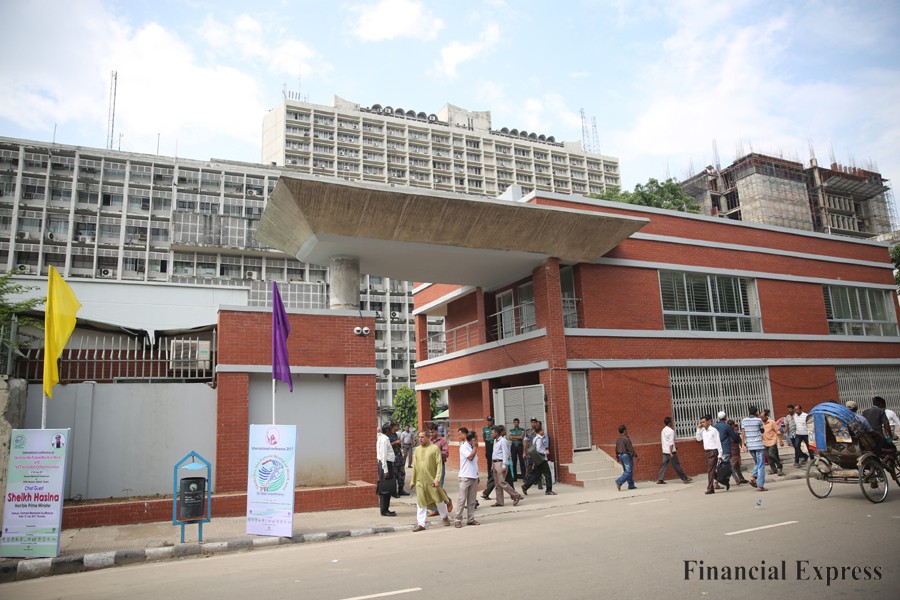
Published :
Updated :

Over the decades, government employees in the country have enjoyed exclusive perks and benefits regardless of their performance. Almost every government extended various benefits to them, ignoring the budget constraints and their due accountability to the people. The primary reason for providing such benefits is to foster loyalty to the government, but it's crucial to remember that public perception is critical and should guide their actions.
During the now-ousted Hasina regime, government employees were awarded numerous privileges, a deliberate move to bias the bureaucracy towards the regime. The employees who were supporters and loyalists to Hasina easily superseded others, their inferior qualification notwithstanding. Instead of enforcing transparency and accountability among government employees, they were rewarded for wrong reasons.
The polarisation and politicisation of government employees severely undermine performance-based evaluation, and many qualified employees are not evaluated. Thus, a distorted public administration structure has developed in the country, and the culture of violating and ignoring citizens' rights has also spread.
The absence of a well-designed carrot and stick policy has also intensified the distortion, as many government employees have started to forget that they are the servants of the country and ultimately accountable to its citizens. They have also forgotten that their salaries and perks come from the taxes paid by the citizens and also public borrowings.
There is a widespread allegation that a large number of government employees fail to deliver their work properly. Many of them are also corrupt and frequently seek bribes. There is also a bad practice of absenteeism at work, which compels citizens to suffer. Poor service delivery is a routine affair in many government offices.
There is no doubt that a good number of employees are efficient and work honestly, maintaining smooth functioning of the government machinery. Their reasonable efforts, however, are undermined by those who are inefficient, corrupt, and greedy.
Against this backdrop, the movement launched by government employees protesting the "Public Service (Amendment) Ordinance, 2025" needs to be reviewed. For the last few days, several government employees have been demanding the cancellation of the ordinance, terming it repressive. The interim government issued the ordinance the previous week amending the Government Service Act, 2018.
The ordinance outlines four offences that constitute misconduct: inciting disobedience or disrupting discipline among employees; being absent or neglecting duties without leave or valid reason, whether individually or collectively; encouraging others to skip work or avoid responsibilities; and obstructing colleagues from performing their duties. Under the ordinance, penalties may include demotion to a lower grade or pay scale, removal from service, or outright dismissal.
The provision of harsh punishments and penalties is the main reason for the protest movement, as government employees, specifically those of the republic, fear that the punishments may be imposed discriminatorily and unfairly. As the protest intensified, along with absenteeism from daily work, the government has indicated a review of the ordinance, along with softening the harsh provisions.
In the meantime, social media have also been flooded with sharp criticism of the inefficiencies of government employees and their various misconducts. Netizens have blasted the public servants, reminding them about their duties and responsibilities, reflecting the people's perception of the government employees. They have raised some critical questions in this connection. For instance, when all private jobs are subject to hire and fire, why are public jobs so protected? Generally, dismissal of a government employee is subject to a complicated procedure, and thus, the individual is safe from such severe punishment.
For decades, government employees have consolidated their positions in various forms. A large number of them have also proved less capable and less efficient and, as a result, unable to provide optimal service. Why the taxpayers have to pay for such inefficiency and inability is a serious question. Instead, taxpayers have no objection to bearing the cost of efficient and dedicated employees. It is, thus, time to overhaul the public administration through substantive reforms. The need for reform is compelling and government employees need to keep in mind that they are neither the owners of the country nor superior to ordinary citizens. A change in mindset is necessary to realise their fundamental roles and responsibilities.
asjadulk@gmail.com


 For all latest news, follow The Financial Express Google News channel.
For all latest news, follow The Financial Express Google News channel.